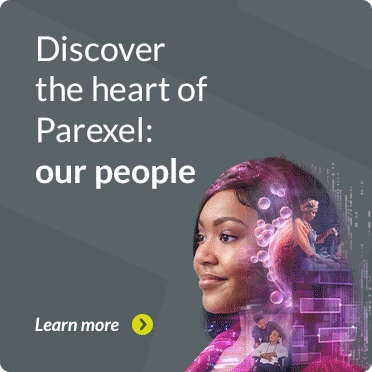How sponsors can make it easier for rare disease patients and families to participate in trials
This article is part of a series about challenges and opportunities in developing treatments for Alzheimer’s and Dementia.
New Parexel research reveals top challenges for sponsors conducting clinical trials in rare neurological disorders.
Parexel recently conducted a study to understand how patients and their caregivers experience living with rare neurological disorders. Rachel Smith, Global Head of the Rare Disease Center of Excellence at Parexel, shares top-line findings about how sponsors can recruit and retain patients more effectively in clinical trials of neurological conditions. (We describe the methodology at the end of this Q&A.)
What was the most surprising finding from your research?
Smith: Mental health support is often overlooked or thought of as separate from primary medical care and treatment plans for rare disease patients. While that was not surprising—we know there are significant challenges with mental health provision globally—the shocking element was that the healthcare professionals we spoke to saw it as the patient’s responsibility to raise mental health challenges with their provider and seek out support. This was unexpected because mental wellness is fundamental to a patient’s or caregiver’s well-being.
Mental health support is vital for people grappling with intractable, degenerative diseases that gradually rob them of functions essential to daily living. For example, we interviewed one woman who had finished college, earned a graduate degree, and planned a professional career, a family, and a full life. Instead, she was diagnosed with ALS at the age of 27. Her plans were upended; three years later, she was divorced, childless, and unable to work.
It is not just significant life events that are impacted; families that receive serious neurological diagnoses lose countless everyday pleasures. Imagine never seeing your child smile or laugh or set off for the first day of school (either because they have been diagnosed and are unable to function or their child has and no longer has a normal life).
It’s critical to proactively monitor the mental health status of patients suffering from devastating diseases like ALS and to think of mental and physical health as one. In clinical development, we can integrate online support for patients’ and care partners’ mental health into the standard care provided during the trial. This is similar to the Employee Assistance Programs rolled out across the industry. We should also explore mental health support services at sites to ensure they conduct regular mental health check-ins as part of a clinical trial. At Parexel, we offer any patient who participates in our advisory councils or provides patient insights direct access to independent support and counseling via Parexel’s Employee Assistance Program.
What is the biggest challenge for newly diagnosed patients?
Smith: Patients receiving frightening diagnoses are desperate for credible information and guidance. Our research revealed that in most cases, their primary physician may not know much about the condition due to its rarity and may even offer misleading information. Further, they may not consider the fear and anxiety of the individual sitting before them. We must take this into account when recruiting patients.
For example, we interviewed one young athlete with myasthenia gravis (MG) whose neurologist told her to stop exercising immediately. He said she would never run again and would probably end up in a wheelchair, based on the average experience of MG patients. “I think he was just following a checklist of dangers to warn me about instead of considering me as an individual,” she told us. She researched the issue online and found that physical activity is safe for MG patients and can improve muscle strength and function. For her, it was critical to keep exercising. She has since found a neurologist who treats her as an individual and a patient expert with lived MG experience.
In this example, the patient could study the issue for herself—not everyone can. Some patients are less educated or unable to access and search the internet. We spoke with one young MG patient who set up her own MG support group because the patients her primary care physician connected her with were a decade or more older than her. Also, much of the information she received about MG was outdated, fatalistic, and gloomy.
We advise sponsors to provide credible, up-to-date educational resources for newly diagnosed patients, referencing trusted sources to help empower their decision-making. The best materials are in simple formats, such as one-page info sheets or short videos, accompanied by trial information that is age and culturally appropriate. These can help establish a study brand and identity that resonates with the patient population.
What did you learn about caregivers’ experiences?
Smith: Caregiving for a rare neurologic disease is an enormous responsibility, and most families require external resources to meet a patient’s needs.
We interviewed one young man who felt frustrated by having to justify an outside caregiver to help him deal with DMD and its impact on routine activities. “It feels unfair that you have to justify things most people take for granted,” he said.
Resources for care partners are often lacking, increasing the burdens of these diseases in day-to-day life. One recent study found that DMD caregivers face constraints and costs that negatively impact their mental health and financial well-being.1
Protocol design and planning must assess a patient’s caregiving needs—according to each stage of the disease and individual circumstances —and provide adequate support and resources for care partners. This will sometimes involve a trial concierge, travel reimbursement, and activities or games for the children of care partners. Extending communication to the broader support community, such as schools, community centers, or places of worship, can also be effective.
Many family member caregivers would do anything; one wife told us she would drive “to the ends of the earth” for her husband’s Huntington’s disease (HD) trial visits. However, just because she would does not mean she should. Overstressing care partners threatens trial recruitment and retention and jeopardizes patients’ trust in the pharmaceutical industry. One mother of four we spoke with despairs that, because of the time she spends caring for her child with DMD, she has less time and energy for her other three children. Thoughtful sponsors can minimize additional burdens and make it easier for patients and their families to participate in clinical trials.
How do patients view clinical trials?
Smith: Most patients we surveyed are interested in clinical trials but are unaware of the opportunities and lack access. They are motivated to enroll to find better treatments and raise awareness of rare diseases.
Our research revealed that patients with rare neurological conditions are deeply frustrated with the tight eligibility criteria for clinical trials. Many are excited to locate a trial only to realize they are too early or too late on the diagnosis-to-disease progression spectrum to qualify.
For example, many people take tests that show they have the gene for HD but remain pre-symptomatic—they are “previvors.” Most trials require symptomatic HD so that the drug can demonstrate an impact on progression. Likewise, if a patient has advanced disease, they are often excluded from studies because it is more unlikely any therapy will show improvement. Accommodating earlier or later diagnoses in progressive diseases will require greater flexibility from regulators and sponsors, and sponsors could offer expanded access programs (EAP) for compassionate treatment of those who do not meet stringent criteria but might benefit.
Inclusion and exclusion criteria are rarely explained to patients in language they can understand, leaving them to feel the process is unfair. Sponsors can critically review criteria, clarify the reasons for each exclusion, and provide site study teams with patient experience and sensitivity training. In addition, sponsors could foster goodwill by offering a forum for patients to challenge some eligibility criteria and receive feedback. Patient advocacy groups or patient and expert panels could mediate these exchanges.
For example, about 60 percent of patients with ALS are excluded from clinical trials because sponsors use step-wise eligibility criteria to allow for homogeneous results.2 Yet ALS is a heterogeneous disease. One such criterion, the pulmonary function measure known as forced vital capacity (FVC), has been used for decades to qualify patients for ALS trials. Although FVC can be a prognostic indicator, the impact of including patients with poor FVC on the statistical significance of trial results has not been studied sufficiently. We may inappropriately exclude ALS patients based on FVC when alternative tests such as electromyography (EMG) may be more suitable.
How can clinical trials for neurological disorders be improved?
Smith: We have found that trusted providers can significantly affect how well a patient’s treatment plan and well-being progress. However, it is challenging for many rare neurological disease patients to trust care providers because of the limited availability of specialists and the difficulties patients have communicating with them. We advise creating a detailed medical communications guide and ensuring sites are compassionate and responsive to patients’ concerns.
Personal touches such as regular one-on-one check-ins, birthday cards, digital gaming, and sticker charts can build trust, especially with pediatric patients. Coordinating services with sites and including a patient’s care team in trial participation discussions is ideal. Providers can perform a procedure on a child’s teddy bear first, then the child, to foster trust during a pediatric site visit.
Many rare disease patients will likely have had negative experiences with the healthcare system. It takes an average of 4.8 years for a rare patient to receive an accurate diagnosis, during which they may have encountered inefficient testing and providers who didn’t listen to their concerns or answer their questions; many of our respondents actively referenced medical gaslighting in their rare disease journey.
Providers should take time to understand each patient’s situation and acknowledge their past to foster trust pre- and post-consent. Then, continuous, individualized communication in a style and frequency that suits the patient can build on that foundation and make the trial work better for the sponsor and the patient.
Finally, it can help to aggressively publicize trials on patient advocacy websites and resource portals such as Global Genes. It is also essential to target healthcare providers who are sometimes unaware of trials, even those underway at their institutions. Clinical trials for rare neurological disorders often require coordination of staff from multiple departments who may not typically work together; for example, we are currently conducting a trial that enrolls patients with a specific complication from the Neonatal Intensive Care Unit, the Pediatric Intensive Care Unit, and the Intensive Care Unit. To educate staff from all three units about the trial and its criteria, we sent an email blast and placed posters in each unit’s staff room. Sponsors can also present trial details at site-run Research Days.
Methodology
Parexel conducted qualitative, in-depth interviews, digital ethnography, and quantitative surveys of a total of 286 patients, caregivers, and healthcare providers in North America, Europe, Latin America, Asia Pacific, and the Middle East, focusing on four rare neurologic conditions: amyotrophic lateral sclerosis (ALS), myasthenia gravis (MG), Duchenne Muscular Dystrophy (DMD), and Huntington’s disease (HD).
Expertise for even the most complex trials
At Parexel, rare disease clinical research is an integral part of what we do, and we take it personally. Our Center of Excellence for Rare Diseases leadership team combines clinical, regulatory, genomics, biostatistical, and commercial expertise to accelerate drug development and maximize the chances for market access and success. We are ready to help sponsors navigate adaptive study designs and select optimal endpoints for rare disease trials. Complex protocols must still meet timelines, minimize patient burdens, and incorporate patient feedback throughout the study. We expedite site startup and study management so rare disease patients have a better chance to enroll and potentially save or improve their quality of life. Our extensive experience—including support for rare populations—enables us to apply previous insights and improve operational efficiency. Parexel has worked on 490 rare disease projects in the past five years, enrolling more than 85,000 patients at 17,500 sites.
Do you want to execute complex rare disease clinical trials while seamlessly aligning studies with the journey of the patient and caregiver? Find out more.
Want to hear from our experts on the latest topics in rare diseases? Visit our Insights Center to read, watch, and listen. See insights.
About the author
Rachel brings more than a decade of experience in every development phase of rare disease and cell and gene therapy clinical trials to her work with Parexel’s rare disease clients. Previously, she served as Vice President of Clinical Operations, Portfolio Director of Rare Diseases, and Global Head of the Cell & Gene Center of Excellence at Veristat LLC. She led programs in ADA-SCID, Canavan disease, congenital adrenal hyperplasia, Fabry disease, Gaucher disease, metachromatic leukodystrophy, and Wiskott-Aldrich Syndrome. Rachel has expertise in clinical development strategy, novel and adaptive trial design, decentralized trials, and other creative solutions for rare disease products with a non-classical route to market.
Read the next blog in the Neuroscience series
Learn more about Neuroscience at Parexel
References
2 Refining eligibility criteria for amyotrophic lateral sclerosis clinical trials. Neurology (2019).
Related Insights
Podcast
Enabling Successful Sites, Episode 2: Empowering Sites to be More Inclusive Through Cultural Sensitivity Training
Jun 28, 2024
Podcast
De-risking Drug Development | Episode 1: How to drive value in pre-clinical development
May 28, 2024
Blog
Understanding mental health challenges in rare disease
Mar 4, 2025
Blog
Building a program for patient-guided clinical research for Alzheimer’s disease
Jan 24, 2024
Blog
Newly released FDA data and approvals signal a more welcoming regulatory environment for neuroscience clinical trials
Oct 3, 2023
Blog
Studying rare cancer patient populations using integrated genomic and real-world data
Aug 30, 2023
Blog
Celebrating 40 Years of Rare Disease Progress: WODC Highlights
Jun 6, 2023
Report
New Medicines, Novel Insights: Advancing rare disease drug development
May 22, 2023
Playbook
Insights from the 2022 R&D Innovation Survey
Feb 17, 2023
Blog
Improving and accelerating clinical research in dementia by integrating the patient’s voice throughout the development journey
Jan 24, 2024
Blog
New CNS Franchise Leader brings experience from pharma and as a clinician and researcher
Nov 14, 2022
Article
Relyvrio Approval: Lessons Learned
Oct 31, 2022
Related Insights
Podcast
Enabling Successful Sites, Episode 2: Empowering Sites to be More Inclusive Through Cultural Sensitivity Training
Jun 28, 2024
Podcast
De-risking Drug Development | Episode 1: How to drive value in pre-clinical development
May 28, 2024
Blog
Understanding mental health challenges in rare disease
Mar 4, 2025
Blog
Building a program for patient-guided clinical research for Alzheimer’s disease
Jan 24, 2024
Blog
Newly released FDA data and approvals signal a more welcoming regulatory environment for neuroscience clinical trials
Oct 3, 2023
Blog
Studying rare cancer patient populations using integrated genomic and real-world data
Aug 30, 2023
Blog
Celebrating 40 Years of Rare Disease Progress: WODC Highlights
Jun 6, 2023
Report
New Medicines, Novel Insights: Advancing rare disease drug development
May 22, 2023
Playbook
Insights from the 2022 R&D Innovation Survey
Feb 17, 2023
Blog
Improving and accelerating clinical research in dementia by integrating the patient’s voice throughout the development journey
Jan 24, 2024
Blog
New CNS Franchise Leader brings experience from pharma and as a clinician and researcher
Nov 14, 2022
Article
Relyvrio Approval: Lessons Learned
Oct 31, 2022






